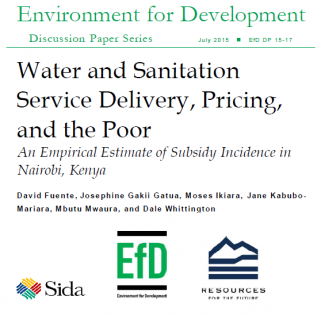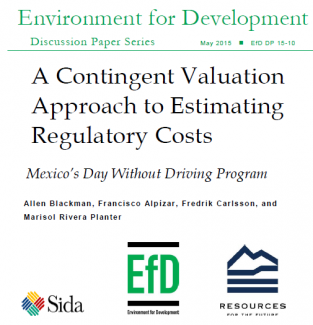FILTER
Displaying 171 - 180 of 211 publications
The study attempts to estimate the demand for cigarettes in Tanzania and presents simulation results on the effect of the cigarette excise tax on smoking participation, government revenue, and related…
| Peer Reviewed | TanzaniaAbstract: In this paper, we analyze water demand by urban households in Rwanda who currently lack a piped connection into their home. The analysis uses data from a cross-sectional survey. The results…
| Peer Reviewed | SwedenAbstract: Gendered food security gaps between female- and male-headed households (FHHs and MHHs) can be decomposed into two sets of components: those explained by observable differences in levels of…
| Peer Reviewed | SwedenAbstract: Poverty and altered planning horizons brought on by the HIV/AIDS epidemic can change individual discount rates, altering incentives to conserve natural resources. Using longitudinal…
| Peer Reviewed | Sweden, KenyaThe research analyzes the impact of climate change (including increased variability and less predictability of temperature and rainfall) on food security in Kenya. The study is based on county-level…
| Research Brief | KenyaEven though antiretroviral treatment is becoming more efficient and available, new HIV infections still occur, and this is particularly evident in the sub-Saharan Africa region. Heterosexual…
| Peer Reviewed | South Africa, TanzaniaUsing a unique city-level panel on the daily air pollution index (API) and fine-scale meteorological data from 2009 to 2013 in China, we examine the existence and the magnitude of spatial spillover…
| EfD Discussion Paper | ChinaThe increasing block tariff (IBT) is among the most widely used tariffs by water utilities, particularly in developing countries. This is in part due to the perception that the IBT can effectively…
| EfD Discussion Paper | KenyaIn this article we present results from the Cape Area Panel Study investigating how income comparisons affect the subjective well-being of young adults and parents. The article builds on previous…
| Peer Reviewed | South AfricaA Contingent Valuation Approach to Estimating Regulatory Costs: Mexico’s Day Without Driving Program
Little is known about the cost of environmental regulations such as residential zoning restrictions and recycling mandates that target households instead of firms, partly because of significant…
| Discussion Paper, EfD Discussion Paper | Central America and Mexico

